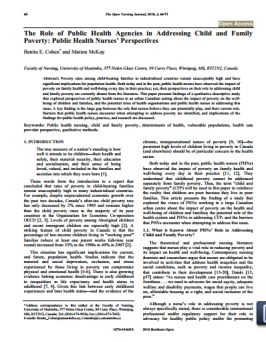The role of public health agencies in addressing child and family poverty: Public health nurses’ perspectives
This study, by two public health nursing faculty from the University of Winnipeg, is a first in Canada. It examined, from the perspective of PHNs themselves, the role of both public health nurses (PHNs) and organizations in addressing child and family poverty. The study is a qualitative analysis of focus group conversations with 23 PHNs working in an urban Canadian setting.
PHNs described feeling impotent and frustrated in the face of systemic barriers to meaningful action (e.g., a lack of accountability for poor housing conditions, and inefficient or inappropriate responses to issues related to child poverty). They also identified constraints at an organizational level that resulted in a significant gap between their current role and what they perceived they were capable of achieving. One significant constraint is an organizational focus on individual responsibility rather than on the social determinants of health. Participants identified the following ways to overcome these constraints: expand PHN roles to include monitoring, advocacy, and community development; include service providers and recipients in needs assessments and program evaluations; and expand the mandate of health organizations to include community development, and advocacy for the social determinants of health.
Use this article to:
• Learn about the impact of poverty on child and family health.
• Review potential organizational strategies to maximize the expertise of PHNs in reducing health inequities experienced by children and families.
• Better understand the potential role of a practitioner in helping to reduce the impact of poverty on the health of children and families
Reference: Cohen, B., & McKay, M. (2010). The role of public health agencies in addressing child and family poverty: Public health nurses’ perspectives. The Open Nursing Journal, 4, 60-71.
